英语专业四级语法汇总解析
完整版专四英语语法考点分析解析
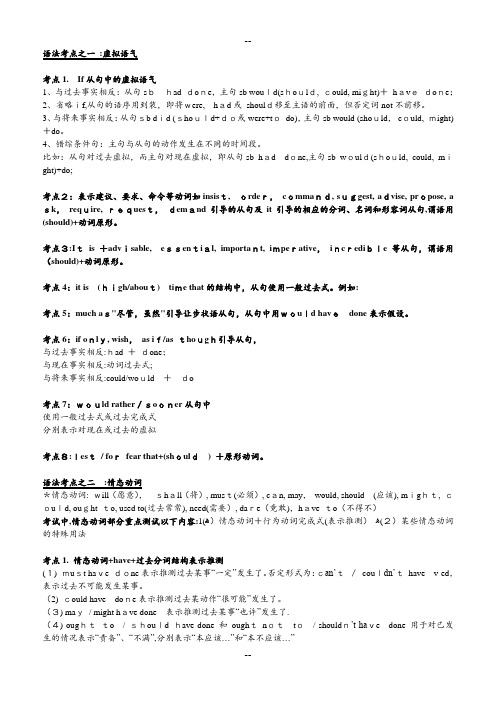
语法考点之一:虚拟语气考点1.If从句中的虚拟语气1、与过去事实相反:从句sbhad done,主句sb would(should, could, might)+havedone;2、省略if,从句的语序用到装,即将were,had或should移至主语的前面,但否定词not不前移。
3、与将来事实相反:从句sb did (should+do或were+todo),主句sb would (should,could, might)+do。
4、错综条件句:主句与从句的动作发生在不同的时间段。
比如:从句对过去虚拟,而主句对现在虚拟,即从句sb had done,主句sb would(should, could, might)+do;考点2:表示建议、要求、命令等动词如insist,order,command, suggest, advise, propose, a sk,require, request,demand引导的从句及it引导的相应的分词、名词和形容词从句,谓语用(should)+动词原形。
考点3:Itis +advisable,essential, important, imperative,incredible等从句,谓语用(should)+动词原形。
考点4:it is(high/about)time that的结构中,从句使用一般过去式。
例如:考点5:much as"尽管,虽然"引导让步状语从句,从句中用would havedone表示假设。
考点6:if only, wish,as if/as though引导从句,与过去事实相反:had +done;与现在事实相反:动词过去式;与将来事实相反:could/would+do考点7:would rather/sooner从句中使用一般过去式或过去完成式分别表示对现在或过去的虚拟考点8:lest/ forfear that+(should) +原形动词。
英语专四语法考点总结
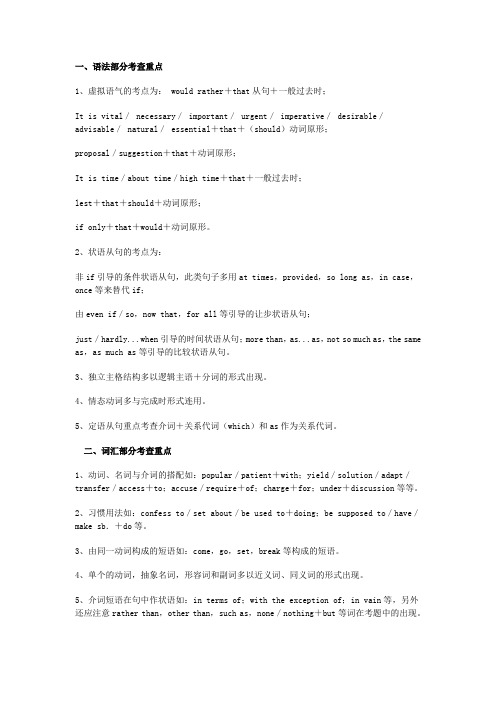
一、语法部分考查重点1、虚拟语气的考点为: would rather+that从句+一般过去时;It is vital/ necessary/ important/ urgent/ imperative/ desirable/advisable/ natural/ essential+that+(should)动词原形;proposal/suggestion+that+动词原形;It is time/about time/high time+that+一般过去时;lest+that+should+动词原形;if only+that+would+动词原形。
2、状语从句的考点为:非if引导的条件状语从句,此类句子多用at times,provided,so long as,in case,once等来替代if;由even if/so,now that,for all等引导的让步状语从句;just/hardly...when引导的时间状语从句;more than,as...as,not so much as,the same as,as much as等引导的比较状语从句。
3、独立主格结构多以逻辑主语+分词的形式出现。
4、情态动词多与完成时形式连用。
5、定语从句重点考查介词+关系代词(which)和as作为关系代词。
二、词汇部分考查重点1、动词、名词与介词的搭配如:popular/patient+with;yield/solution/adapt/transfer/access+to;accuse/require+of;charge+for;under+discussion等等。
2、习惯用法如:confess to/set about/be used to+doing;be supposed to/have/make sb.+do等。
3、由同一动词构成的短语如:come,go,set,break等构成的短语。
专业四级词汇语法详细解答40套

Test Twenty Five近义词辨析source, origin, root, resource这组词均含有“打破”或“挤碎”的意思。
source和origin都表示某事的“起源,开端”。
source原指河流的源头,其引申义可用来指某事物的最初来源或出处,在指非物质或无形的事物时尤其如此。
source还常指消息等的“来源,出处”。
origin常译为“起源,发源,起因”,指导致某事物最后出现或形成的因素,或某事物在遥远的空间以外或久远的年代以前的最初形态,常表示某种历史文化现象、风俗习惯的“起源”,有时可译为“起因”。
root的意义是“根源,起因”,它强调导致某事物最终出现的最初的、最根本的、最重要的原因,由此所产生的现象或事物常成为一种外观的产物。
resource主要指一个国家或地区可以取用的“资源,财力,资产”,一般以复数形式出现。
resource 也可指人在处理问题时所表现出的“才智,机敏”,此时resource为不可数名词。
Literature is a source of endless pleasure to many thousands.文学是很多人快乐的无尽源泉。
Do you know the origin of the custom of giving presents at Christmas?你知道在圣诞节互赠礼品这一风俗的来源吗?The root of the question lay in the seizure of the land of Ireland by the English ruling class.这个问题的根源在于英国统治阶级对爱尔兰土地的攫取。
The mortgage is a drain on our financial resources.偿还抵押贷款是我们财务上的一大负担。
ordinary, mediocre, commonplace这组词均含有“平常的,普通的”的意思。
专四语法归纳总结解读

一些搭配与主谓一致
• • • • • • • • a great many + 可数名词复数 many a + 可数名词单数 a number of +可数名词复数 the number of +可数名词复数 the majority of +可数名词复数 neither/either of +可数名词复数 more than one +可数名词单数 one and a half +可数名词复数 谓语用复数 谓语用单数 谓语用复数 谓语用单数 谓语用复数 谓语用单数 谓语用单数 谓语用单数
• 专四中常见的虚拟语气形式。 1) wish后的宾语从句 I wish I knew what was going to happen. 2)suggest (suggestion),propose(proposal),advise (advice)demand, insist, order, request, require, recommend, desire, ask, decide等。在这些从句中,谓语 形式为should加动词原形,should可以省略。 例:The general’s command was that the soldiers _____ their fort and carry out more important task. A. would leave B. leave C. left D. have left (答案:B)(2002年49题) 例:It’s desired that she _____ to teach us at least twice a week. A. comes B. will com C. come D. may come (答案:词作主语主谓一致 1)通常作复数的集体名词 集体名词,如:police, people,cattle,militia民兵,poultry家禽 等, 通常作复数,用复数动词。如: Domestic cattle provide us with milk, beef and hides. 2)通常作不可数名词的集体名词 有些集体名词,如foliage叶 子,machinery,equipment,furniture,merchandise,通常作不可数 名词,随后的动词用单数。例如: All the machinery in the factory is made in China. 3)既可作单数也可作复数的集体名词 集体名词,如audience, committee, class, crew, family, public, government等,既可作单数,也可作复数用。 The city council is meeting to set its agenda. 4)a committee,etc. of +复数名词 如果主语是由“a committee of /a panel of /a board of +复数 名词”构成,随后的动词通常用单数。例如: A committee of five men and three women is to consider the matter.
专四常考语法点汇总

专四常考语法点汇总语法与词汇专项语法核⼼考点⼀:从属分句复合句= 主句+从句(1个或1个以上)要点1从属分句是复合句必不可少的组成部分,以语法功能作为分类标准,从属分句可以分为状语从句、关系从句(即定语从句)和名词性从句。
其中状语从句可分为时间、地点、原因、结果、程度、⽬的、条件、让步和⽅式等;名词性从句可分为主语从句、宾语从句、表语从句、同位语从句。
要点 2 状语从句的考点集中在⽅式、条件、让步、⽅式和时间状语从句上;关系从句的考点集中在关系代词的选择,限制性定语从句和⾮限制性定语从句的区别;名词性从句的考点集中在宾语从句和同位语从句。
⼀状语从句状语从句真题剖析:1 Nine is to three _____ three is to one. (2008, 53)A. whenB. thatC. whichD. what2 ______ he wanted to go out with his friends at the weekend, he had to stay behind to finish his assignment. (2008, 55)A. Much thoughB. Much asC. As muchD. Thouth much3 Men differ from animals ____ they can think and speak. (2008, 54)A. for whichB. for thatC. in thatD. in which4 They stood chatting together as easily and naturally as ____. (2008, 60)A. it could beB. could beC. it wasD. was5 The couple had no sooner got to the station ______ the coach left. (2009,60)A. whenB. asC. untilD. than6 ____ the boss says, it is unreasonable to ask me to work overtime without pay. (2010,55)A. WhateverB. WheneverC. WhicheverD. However7 Fool ____ Jerry is, he could not have done such a thing.A. whoB. asC. likeD. that8 He asked me to lend him some money, which I agreed to do, ___ that he paid me back the following week. (2005)A. on occasionB. on purposeC. on conditionD. only if9 Which of the following contains an adverbial clause of cause?A. I got a job as soon as I left university.B. As there was on answer, I wrote again.C. You must do the exercise as I show you.D. Wealthy as he is, Mark is not a happy man.状语从句重点总结:⼏种不常⽤的条件状语从句举例:In the event that she can not arrive on time, we will go first.Suppose it snowed, we would still go.Say what he said were true, what would you do about it?1. ⼏种不常⽤的让步状语从句举例:In spite of the fact that he was deaf and dumb, he had a genius for music.While the grandparents love the children, they are strict with them.Much as she needed the job, she had to refuse.For all that there were a lot of difficulties, he finally entered the final competition and won.Granted you have made much progress, you should not be conceited.2. ⽤了although或though,就⼀定不能再后⾯的从句中同时⽤but,但是though 可以和yet 连⽤。
专四语法(做完题总结)解读
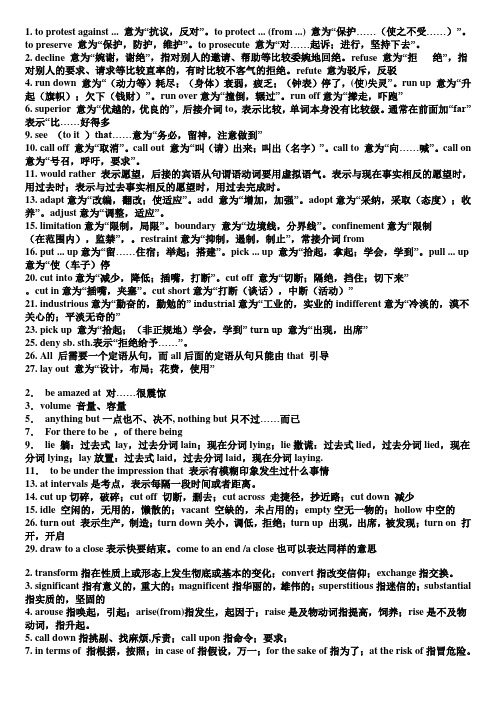
1. to protest against ... 意为“抗议,反对”。
to protect ... (from ...) 意为“保护……(使之不受……)”。
to preserve 意为“保护,防护,维护”。
to prosecute 意为“对……起诉;进行,坚持下去”。
2. decline 意为“婉谢,谢绝”,指对别人的邀请、帮助等比较委婉地回绝。
refuse 意为“拒绝”,指对别人的要求、请求等比较直率的,有时比较不客气的拒绝。
refute 意为驳斥,反驳4. run down 意为“(动力等)耗尽;(身体)衰弱,疲乏;(钟表)停了,(使)失灵”。
run up 意为“升起(旗帜);欠下(钱财)”。
run over意为“撞倒,辗过”。
run off意为“撵走,吓跑”6. superior 意为“优越的,优良的”,后接介词to,表示比较,单词本身没有比较级。
通常在前面加“far”表示“比……好得多9. see (to it )that……意为“务必,留神,注意做到”10. call off 意为“取消”。
call out 意为“叫(请)出来;叫出(名字)”。
call to 意为“向……喊”。
call on 意为“号召,呼吁,要求”。
11. would rather 表示愿望,后接的宾语从句谓语动词要用虚拟语气。
表示与现在事实相反的愿望时,用过去时;表示与过去事实相反的愿望时,用过去完成时。
13. adapt意为“改编,翻改;使适应”。
add 意为“增加,加强”。
adopt意为“采纳,采取(态度);收养”。
adjust意为“调整,适应”。
15. limitation意为“限制,局限”。
boundary 意为“边境线,分界线”。
confinement意为“限制(在范围内),监禁”,。
restraint意为“抑制,遏制,制止”,常接介词from16. put ... up意为“留……住宿;举起;搭建”。
英语专业四级-词汇、语法详细解答_2

专业四级:词汇、语法详细解答2名词+不定式与名词+介词+ ing分词有些名词如attempt, chance, effort, freedom, intention, reason, necessity, opportunity, time, way 等,在其后用不定式或介词+ ing分词均可,意义无甚区别。
例如:The doctor made a bold attempt to save/at saving the child’s life.有些名词如ability, agreement, ambition, anxiety, curiosity, mind, obligation, permission, refusal, tendency, wish等,在其后通常带不定式,而不带介词+ ing分词。
例如:Our ability to think and speak separates us from other mammals.还有些名词如aptitude, experience, hope, method, possibility, difficulty, interest, plan, habit, passion, genius等,其后通常带介词+ ing分词,而不带不定式。
例如:There is no hope of winning the game.近义词辨析strange, eccentric, odd, peculiar, queer, unique这组词均含有“不平常的”或“奇怪的”的意思。
strange词义最广。
指非一般的、不平常的、费解的或与预期不同的,还强调陌生,不熟悉。
With so many strange faces around her, she felt a bit nervous.身边尽是陌生的面孔,她感到有点紧张。
eccentric指行为偏离常规,特别是显得古怪或可笑。
英语专业四级语法重点汇总
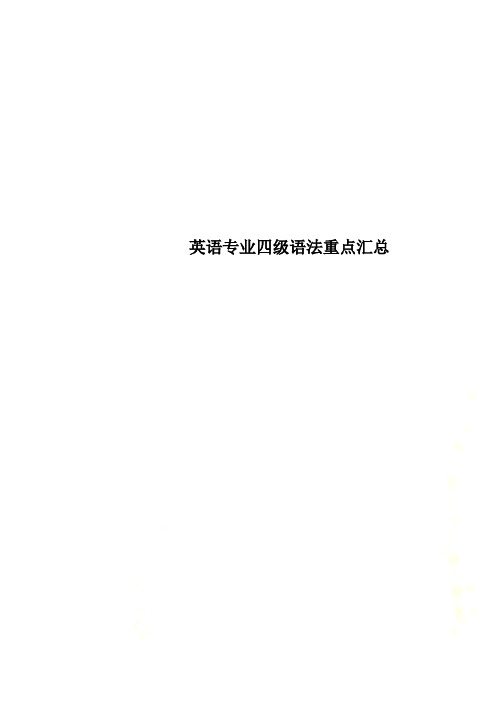
英语专业四级语法重点汇总English英语专八专四学习复习资料英语专四语法重点汇总一、非谓语动词的主要考点1. 有些典型动词后面可以接上不定式或动名词来做宾语的,但是在意思上是有区别的,主要常考到的动词罗列如下:mean to do想要(做某事)VS mean doing意味(做某事)propose to do 打算(做某事)VS propose doing建议(做某事)forget to do忘记(要做的事)VS forget doing忘记(已做的事)remember to do记得(要做某事)VS remember doing记得(做过)go on to do继而(做另一件事)VS go on doing继续(做原来的事)stop to do停下来去做另一件事VS stop doing停止正在做的事regret to do(对将要做的事)遗憾VS regret doing(对已做过的事)后悔2. 不定式的习惯用法典型句型整理如下:如:“cannot help but do”——“不得不做某事”如:“cannot but do”——“不禁做某事”如:“cannot choose but do”——“不由自主地做某事”如:“can do nothing but do”——“不能不做某事”如:“have no choice but to do”——“只能做某事”如:“have no alternative but to do”——“只能做某事”例句:The boy cannot help but be greatly influenced by the useful instruction given by his family tutor.When I start my job career, I cannot choose but look back upon the beautiful days I spent on campus.3. 动名词的习惯用法典型动名词的习惯句型整理罗列如下:如:be busy/active doing sth.如:It’s no good/use doing sth.如:spend/waste time doing sth.如:have difficulty/trouble/problem doing sth.如:have a good/great/wonderful time doing sth.如:There is no point/sense/harm/ use doing sth.例句:There is no use crying over spilt milk.(典型例句)牛奶洒了,哭也没用;后悔是没有用的;覆水难受I really have problem solving these mathematic questions since I am not major in science after all.二、形容词与副词及其比较级1. 形容词的句法功能形容词通常在句子中用做定语、表语与主语的语法成分,通常考到的知识点总结如下:(1) 以“a”开头的形容词如“alone”、“alike”、“asleep”、“awake”等一般不能做前置定语,通常是做表语或后置定语的例句:Jerry didn’t pass the important final exam, please let him alone for the time being.Michael came back from job just now, and his eyes were shut and he seemed to have fallen asleep.(2) 某些以副词词缀“-ly”结尾的词其实是形容词,不能看错是副词,例如“friendly”、“leisurely”、“lovely”等(3) 下列动词既是实义动词又是系动词,注意用做系动词时,要求形容词做表语这些典型单词罗列如下:“remain”、“keep”、“become”、“get”、“grow”、“go”、“come”、“turn”、“stay”、“stand”、“run”、“prove”、“seem”、“appear”、“look”等例句:The situation remains tense between the two countries at this juncture. 在这个节骨眼上,两国形势仍然持续紧张。
专业四级考试词汇语法详解

专业四级考试词汇语法详解英语的演变是一个很有意思的过程,四级英语中有很多词汇都是有很有意思的背景,那么关于它们究竟是怎么样的,又该如何使用呢? 我们一起来看看,以下是小编给大家整理的专业四级考试词汇语法详解,希望可以帮到大家1. c)「句意」公众能否将兔肉接受为比较经济的蛋白质来源要看生产者如何去销售。
?「难点」depend on 后面加一个从句,从句语序应为陈述语序。
?2. d)「句意」这些苹果你千万不要吃,可能没熟。
?「难点」in case意为如果,万一,若,适合本句逻辑关系。
3. b)「句意」虽然发生在发达国家的事情听起来像科幻小说,但也可能发生在世界上其它地区。
?「难点」what引导的从句作为主语,同时,what又是从句的主语。
4. c)「句意」我们最信任的就是他。
?「难点」用来代替 he 的是 who ,who前面有介词的时候要改为宾格whom.5. c)「句意」由于我们用不着着急,我们选择了那条长而风景优美的路线。
「难点」a)错,因为没有go route 的搭配。
b)错,主语应该是being in no great hurry 的主语we.d)错,原因同b)。
?6. b)「句意」两个答案都不正确。
?「难点」neither意为二者无一 ,后接单数谓语动词。
?7. a)「句意」他病了,而我只是有点儿累。
「难点」whereas连接两个句子,又含有转折的意思。
?8. c)「句意」她很有钱,而且很漂亮。
?「难点」what is more是习惯用语,意为另外,而且。
?9. d)「句意」不管怎么说,因为你父亲你才有今天。
?「难点」say what you like 意为不管怎么说。
?10. d)「句意」是你铺的床,你就要躺在上面(自作自受)。
?「难点」as so 意为像那样,也就。
?11. c)「句意」如果读书不是为了消磨时间而是为了获取知识,那么你必须积极去读。
?「难点」pass意为消磨 waste意为浪费 spend意为花费 idle意为虚度,与away连用。
专四语法试题答案与解析

试题答案与解析(一)1. C) 【句意】虽然只懂一点西班牙语,但他还是参加了这个课程的学习。
【难点】know是静态动词,不能用于进行时;选knows从句中又缺少主语。
knowledge作“知识”讲时是不可数名词,但作“了解”讲时,前面可加“a”,常用于词组have a knowledge of中,所以选C)。
2. B) 【句意】你本应该给詹姆斯写信,然而,你没写。
【难点】ought to have written是虚拟语气,与本句句意相符。
3. B) 【句意】约瑟夫幸运地逃了性命;他险些没从房间里逃出来。
【难点】to have escaped 是不定式的完成式,表示过去的某一动作业已完成。
4. A) 【句意】黄油面包受西方人青睐。
【难点】bread and butter 是西方人吃的一种食品,虽然有三个字,表达的却是一个东西,并且是不可数名词,作单数。
5. A) 【句意】我家的后花园有一片草坪,夏天坐在上面会令你心旷神怡。
【难点】which引出非限制性定语从句,在句中作主语,且和sit on 构成动宾关系。
类似的句子有:This room is comfortable to live in 这句中live in 和this room构成动宾关系。
6. C) 【句意】他独自一人开始经商,并且做得很成功。
【难点】on one’s own 是个常用的介词词组,意为“独自”;of one’s own 表示“某人自己的(东西)”,如:I have a flat of my own.我自己有套房子。
7. C) 【句意】约翰的考试分数全班最高;他昨天晚上一定学习了。
【难点】表示对过去某一动作行为的猜测须要用must have done这一句型结构。
8. B) 【句意】弗兰克几乎从未受过任何教育,是不是?【难点】这是一句含有否定副词never的一般过去时的句子,由于主句为否定形式,所以反意问句用肯定形式。
9. C) 【句意】即使他的信明天到也无济于事了。
专四语法总结
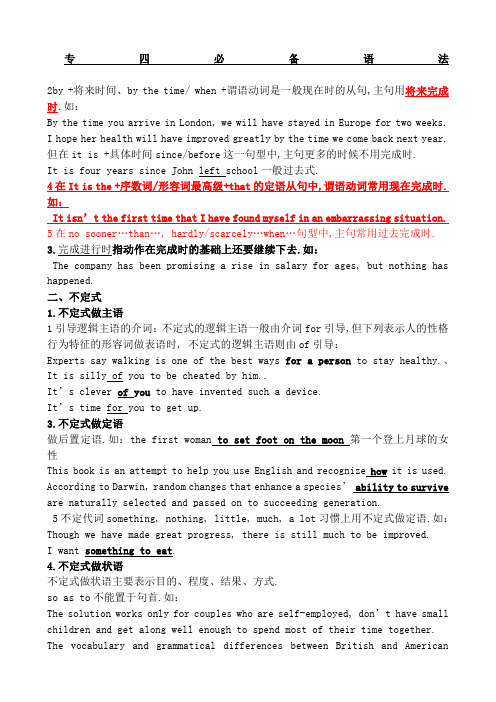
专四必备语法2by +将来时间、by the time/ when +谓语动词是一般现在时的从句,主句用将来完成时.如:By the time you arrive in London, we will have stayed in Europe for two weeks.I hope her health will have improved greatly by the time we come back next year.但在it is +具体时间since/before这一句型中,主句更多的时候不用完成时.It is four years since John left school一般过去式.4在It is the +序数词/形容词最高级+that的定语从句中,谓语动词常用现在完成时.如:It isn’t the first time that I have found myself in an embarrassing situation. 5在no sooner…than…, hardly/scarcely…when…句型中,主句常用过去完成时. 3.完成进行时指动作在完成时的基础上还要继续下去.如:The company has been promising a rise in salary for ages, but nothing has happened.二、不定式1.不定式做主语1引导逻辑主语的介词:不定式的逻辑主语一般由介词for引导,但下列表示人的性格行为特征的形容词做表语时, 不定式的逻辑主语则由of引导:Experts say walking is one of the best ways for a person to stay healthy.、It is silly of you to be cheated by him..It’s clever of you to have invented such a device.It’s time for you to get up.3.不定式做定语做后置定语.如:the first woman to set foot on the moon 第一个登上月球的女性This book is an attempt to help you use English and recognize how it is used. According to Darwin, random changes that enhance a species’ability to survive are naturally selected and passed on to succeeding generation.5不定代词something, nothing, little, much, a lot习惯上用不定式做定语.如:Though we have made great progress, there is still much to be improved.I want something to eat.4.不定式做状语不定式做状语主要表示目的、程度、结果、方式.so as to不能置于句首.如:The solution works only for couples who are self-employed, don’t have small children and get along well enough to spend most of their time together. The vocabulary and grammatical differences between British and AmericanEnglish are so trivial and few as hardly to be noticed.only to表示意想不到的结果,Greatly agitated, I rushed to the apartment and tried the door, only to find it locked.三、动名词1.必须接动名词做宾语的动词牢记下列要求接动名词做宾语的动词:acknowledge, advocate, anticipate, appreciate, avoid, admit, confess, consider, delay, deny, enjoy, escape, excuse, fancy, favor, finish, forgive, imagine, involve, justify, mention, pardon, practice, postpone, recall,recollect,risk, resist, suggest, tolerate.如:I appreciate having been given the opportunity to study abroad two years ago.2.动名词做介词短语考生尤其要识别下列短语中的to是介词,不是不定式符号:object to, resort to, react to, contribute to, look forward to, be accustomed to, be committed to, be exposed to, be subjected to, be devoted to, be dedicated to, be opposed to, be reconciled to, be contrary to, be get used to, come close to, get down to, give oneself up to, prefer…to, see to, set to, take to, in addition to, with regard to, with a view to, on the way to.如:四、分词分词起形容词和副词的作用,在句中做定语或状语.在概念上应清楚:●现在分词表示主动,表示动作在进行.● 过去分词表示被动,表示动作结束了的状态或结果.1.分词做定语,弄清现在分词与过去分词的区别分词短语做定语相当于省略了的定语从句,考生应掌握:1现在分词与被修饰词之间具有主动意义.如:It’s easy to blame the decline of conversation on the pace of modern life and on the vague changes taking place in our ever-increasing world.There was a very interesting remark in a book by an Englishman that I read recently giving what he thought was a reason for this American characteristic.相当于which gave...How many of us attending a meeting that is irrelevant to us would be interested in the discussion相当于How many of us who will attend...2过去分词与被修饰词之间具有被动意义.如:Good news was sometimes released prematurely, with the British recapture ofthe port announced half a day before the defenders actually surrendered.相当于…recapture of the port which had been announced…Just as the value of a telephone network increases with each new phone added to the system,Just with t he value of a telephone network increasing withThe author gave a detailed description based on his personal observation of nature.相当于…description which was based on…an escaped prisoner一个逃犯 a retired worker一位退休工人a faded curtain一个褪了色的窗帘 a newly arrived student一个新来的学生2.分词做状语,注意区分分词的一般式与完成式1表示时间,多置于句首,注意如果分词表示的动作的时间先于谓语动词,要用完成式.如:Having completed one task, we started on another one. complete先于start 之前发生3.分词的独立主格结构分词的逻辑主语一般为句子的主语,否则分词短语要有自己的逻辑主语,称为分词独立主格结构.分词独立主格结构只是句子的一个部分.如:All flights having been canceled because of the snowstorm, we decided to take the train.Darkness setting in, the young couple lingered on merrymaking.Weather permitting , we will go on a picnic.五、非谓语动词的其他考点1.接不定式或动名词做宾语都可以,但在意思上有区别的动词的用法mean to do想要做某事propose to do 打算做某事mean doing意味做某事propose doing建议做某事regret to do对将要做的事遗憾regret doing对已做过的事后悔三、句型:cannot help but do cannot but docannot choose but do can do nothing but dohave no choice/alternative but to do上述句型的意思接近,即“不得不做”、“不禁做”、“不由自主地做”、“不能不做”、“只能做”.如:Nobody can help but be fascinated by the world into which he is taken by the science fiction.When I consider how talented he is as a painter, I cannot help but believe that the public will appreciate his gift.4.there be 非谓语动词的用法1做宾语时取决于谓语动词的持续要求.如:The students expected there to be more reviewing classes before the final exams.expect要求接不定式做宾语2做目的状语或程度状语时用for there to be,做其他状语用there being.如:For there to be successful communication, there must be attentiveness and involvement in the discussion itself by all present. for there to be…在句中做目的状语It isn’t cold enough for there to be a frost tonight, so I can leave Jim’s car out quite safely.for there to be…在句中做程度状语There being no further questions, we’ll stop here today. there being…做原因状语3引导主语用for there to be.如:It is unusual for there to be no late comers today.4做除for外的介词宾语,用there being.如:He would always ignore the fact of there being such a contradiction in his inner thought.六、虚拟语气1.主从句谓语动词的时态如:If the doctor had been available, the child could not have died.2区分主从句表示的不同时间概念:主从句谓语动词所指时间不同,这叫做错综时间条件句,动词形式应根据实际情况来调整.如:Had it not been for the timely investment from the general public, our companywould not be so thriving as it is.主句与现在事实相反,从句与过去事实相反Had Paul received six more votes in the last election, he would be our chairman now.主句与现在事实相反,从句与过去事实相反3识别事实和假设混合句:Your math instructor would have been happy to give you a make-up examination had you gone and explained that your parents were ill at the time.句子前半部分为假设情况,而“父母病了”是事实I would have gone to visit him in the hospital had it been at all possible, but I was fully occupied the whole of last week.前半部分为假设,后半部分是事实2.名词性从句的虚拟形式名词性从句是指宾语从句、主语从句、表语从句和同位语从句.从句的谓语动词需用should+动词原形表示虚拟.考生应熟悉:1下列动词做谓语时,that宾语从句中的动词用虚拟形式:desire, advise, recommend, command, direct, order, ask, demand, request, require insist, maintain, move, propose, prefer, urge, vote.如:In the past men generally preferred that their wives work in the home.I move that he be discharged for his serious mistake.2下列形容词和分词做表语或补语时,that主语从句中动词用虚拟形式:advisable, desirable, insistent, preferable, urgent, appropriate, compulsory, crucial, essential, imperative, important, necessary, obligatory, possible, probable, proper, vital, advised, arranged, commanded, demanded, desired, ordered, proposed, recommended, requested, required, suggested.如:The board deem it urgent that these files should be printed right away.It is essential that all these figures be checked twice.3下列名词接同位语从句或表语从句时,从句中动词用虚拟形式:insistence, preference, recommendation, suggestion, proposal, motion, desire, requirement, request, order, necessity, importance, regulation, rule, resolution, understanding.如:John Wagner’s most enduring contribution to the study of Afro-American poetry is his insistence that it be analyzed in a religious, as well as worldly, frame of reference.They keep telling us it is of utmost importance that our representative be sent to the conference on schedule.3.含蓄虚拟条件句的谓语动词形式含蓄虚拟语气是指假设条件不通过if从句表达,而是暗含在其他结构中.考生应熟悉:1连词but, but that, or, or else;副词otherwise, unfortunately等表示转折假设.如:A safety analysis would have identified the target as a potential danger. Unfortunately, it was never done.Victor obviously doesn’t know what’s happened; otherwise he wouldn’t have made such a stupid remark.2介词短语暗含假设条件,常用的有:without, but for, under more favorable conditions等.如:But for the English examination I would have gone to the concert last Sunday. 3intended/meant/hoped/wished/planned或was/were +不定式完成式或had intended/meant/planned/hoped/wished+不定式一般式暗示虚拟语气.如:I intended to have called on you, but I was busy at that time.4情态动词完成式暗示虚拟语气.如:I should have called to make an airline reservation, but I didn’t.4.常用虚拟形式的句型1从句中动词用过去式或过去完成式表示虚拟的句型:would rather would as soon as though suppose…had rathe r would sooner as if supposing…If only…It is high time that…从句中动词只用过去式如:His wife would rather they didn’t talk about the matter any more.I’d rather you went by train, because I can’t bear the idea of your being in an airplane in such bad weather.If I were in a movie, then it would be about time that I buried my head in my hands for a cry.My father always talks as though he were addressing a public meeting.3If only…要是...就好了谓语动词视情况选用适当的形式.如:If only the committee would approve the regulations and put them into effect as soon as possible.4lest/for fear that/in case 从句谓语用should+动词原形.如:The mad man was put in the soft-padded cell lest he injure himself.3.几个情态动词常考的句型1may/might just as well“不妨,最好”,与had better相近.如:Since the flight was cancelled, you might as well go by train.2cannot/can’t…too… “越……越好,怎么也不过分”.注意这个句型的变体cannot…over….如:You cannot be too careful when you drive a car.4should 除了“应该”一层意思外,大纲还规定要掌握其“竟然”的意思.如:I didn’t expect that he should have behaved like that..3.最高级形式应注意的问题比较级形式表示最高级意义时,比较对象的范围应用:any other +单数名词the other +复数名词the othersanyone/anything else上述词是用来将比较级结构转变成最高级意义的关键词语,切不可遗漏,否则会造成逻辑混乱的错误.1not so much…as…与其说……不如说……The chief reason for the population growth isn’t so much a rise in birth rates as a fall in death rates as a result of improvements in medical care.2no/not any more…than…两者一样都不……The heart is no more intelligent than the stomach, for they are both controlled by the brain.There is no reason they should limit how much vitamin you take, any more than they can limit how much water you drink.3no /not any less…than…两者一样都……She is no less beautiful than her sister.4just as…so….正如……,……也……用倒装结构Just as the soil is a part of the earth, so is the atmospher e.九、平行结构1.注意比较结构中相比较的内容在语法形式上是否相同.如:It is better to die on one’s feet than to live on one’s knees.Despite the temporary difficulties, the manager prefers increasing the output to decreasing it.2.其他具有并列或比较意义的短语.1rather than, let alone虽不是并列连词,但在结构上连接两个语法形式相同的成分.如:We are taught that a business letter should be written in a formal style rather than in a personal style.For the new country to survive, let alone for its people to enjoy prosperity, new economic policies will be required.2如果平行的两个成分在形式上是介词短语,而且介词相同,一般说来第二个介词不要省略.如:At times, more care goes into the composition of newspaper and magazine advertisements than into the writing of the features and editorials.十、代词2.that的指代作用that指代不可数名词和单数可数名词如是复数,用those,后面通常跟有修饰语,如出现在比较结构中的that of.如:Conversation calls for a willingness to alternate the role of speaker with that of listener, and it calls for occasional “digestive pauses” by both.No bread eaten by man is so sweet as that earned by his own labor.3.one的指代作用one指代不确指的单数可数名词,复数为ones.the one 指代确指的单数可数名词.如:A good writer is one who can express the commonplace in an uncommon way.十一、主谓一致问题1.主语与谓语之间有定语从句或其他结构修饰,所以距离较远,考生易误认主语.如:The amount of pressure which the materials are subject to affects the quality of the products.2.关系代词做主语的定语从句中,谓语的数要与先行词一致.如:Despite much research, there are still certain elements in the life cycle of the insect that are not fully understood.There are many valuable services which the public are willing to pay for, but which do not bring a return in money to the community.3.动名词短语、不定式短语、名词性从句做主语,谓语用单数.如:Buying clothes is often a time-consuming job because those clothes that a person likes are rarely the ones that fit him or her.To understand the situation completely requires more thought than has been given thus far.4.主语带有together/alongwith, such as, as well as, accompanied by, including, rather than 等附加成分, 谓语的数不受附加成分的影响.如:The president of the college, together with the deans, is planning a conference for the purpose of laying down certain regulations.5.表示时间、距离、金额、重量、面积、体积、容积等度量的名词短语做主语时,谓语用单数.6.某些固定结构中谓语的数:a great many + 可数名词复数谓语用复数many a + 可数名词单数谓语用单数a number of +可数名词复数谓语用复数the number of +可数名词复数谓语用单数the majority of +可数名词复数谓语用复数each/every +可数名词单数谓语用单数neither/either of +可数名词复数谓语用单数more than one +可数名词单数谓语用单数one and a half +可数名词复数谓语用单数the greater part of / a large proportion of / 50% of/ one third of / plenty of / the rest of谓语的数与of后面的名词一致十二、倒装结构2.以only修饰状语开头的句子,句子的主谓要部分倒装Only you主语can do this.Only when you have obtained sufficient data can you come to a sound conclusion.3.以下列副词或短语开头的句子,句子的主谓要部分倒装often, so, well, to such a degree, to such an extent, to such extremes, to such a point,many a time.如:So involved with their computers do the children become that leaders at summer computer camps often have to force them to break for sports and games.4.以下列副词开头的句子,句子的主谓要全部倒装1出于修辞需要,表示方向的副词:out, down, in, up, away, on.如:Here comes the teacher. Here you are.Down jumped the burglar from the tenth floor when he heard someone shouted at him.2出于习惯用法:here, there, now, thus, hence, then.如:Now is your turn. There goes the bell.5.让步从句的倒装1as引导让步状语从句,必须采用倒装结构,但不是主谓倒装,而是将被强调的内容置于句首.如:Much as I have traveled, I have never seen anyone to equal her, in thoroughness, whatever the job.2出现在句型be+主语+其他, come what may中.如:Our civilization has accumulated an incredible amount of knowledge—be it scientific or artistic.The business of each day, be it selling goods or shipping them, went quite smoothly.Come what may, I’ll be on your side.6.比较从句的倒装as, than引导的比较从句中,如果主语是名词短语且较长,经常采用倒装结构不倒装也可以.注意:这种结构主语一般为名词,如果是代词则不倒装.如:Hydrogen burns much more cleanly than do other fuels and is easy to produce. Reading is to the mind as is exercise to the body.十三、复合句——形容词性定语从句1.尤其要注意whose的用法whose在从句中做定语,修饰名词.所以,如果关系代词后面紧接的是名词,且关系代词又不在从句中做主语或宾语,那么,这个关系代词就应该是whose.如:2.介词 + which的用法如果从句中主宾成分齐全,考生便可考虑关系代词是否在从句中做状语,而状语通常用介词短语充当,于是可以得知,关系代词前面应有介词,再分析所给的选项,根据与名词的搭配作出正确选择.如:We are not conscious of the extent to which work provides the psychological satisfaction that can make the difference between a full and an empty life.3.as 与which用作关系代词的区别1as与the same, such, so, as等关联使用.如:As the forest goes, so goes its animal life.2as和which都可以引导非限定性定语从句,但as在句中的位置比较灵活,可出现在句首、句中、句末,而which只能出现在句末,尤其是当先行词是整个句子时.如:As is true in all institutions, juries are capable of making mistakes.As is generally accepted, economic growth is determined by the smooth development of production.常见的这类结构有:as has been said before, as has been mentioned above, as can be imagined, as is known to all, as has been announced, as can be seen from these figures, as might/could be expected, as is often the case, as has been pointed out, as often happens, as will be shown等.4.关系代词that与which用于引导定语从句的区别1如果关系代词在从句中做宾语,用that, which都可以,而且可以省略;2先行词是不定代词anything, nothing, little, all, everything时,关系代词用that;3先行词由形容词最高级或序数词修饰或由next,last, only, very修饰时,用that;4非限定性定语从句只能用which引导;5关系代词前面如果有介词,只能用which.5.but做关系代词,用于否定句,相当于who…not, that…not这个结构的特点是主句中常有否定词或含有否定意义的词.如:There are few teachers but know how to use a computer.There is no complicated problem but can be solved by a computer.十四、复合句——名词性从句一个句子起名词的作用,在句中做主语、宾语/介词宾语、表语、同位语,那么这个句子就是名词性从句.1.what/whatever的用法考生应把握:what是关系代词,它起着引导从句并在从句中担当一个成分这两个作用.如:They lost their way in the forest, and what made matters worse was that night began to fall.what既引导主语从句又在从句中做主语Water will continue to be what it is today—next in importance to oxygen.what既引导表语从句又在从句中做表语2.whoever和whomever的区别whoever和whomever相当于anyone who,用主格与宾格取决于其在从句中做主语还是做宾语.如:They always give the vacant seats to whoever comes first. whoever在从句中做主语3.有关同位语从句的问题1引导词通常为that, 但有时因名词内容的需要,也可由whether及连接副词why, when, where, how引导.that不表示任何意义,其他词表示时间、地点、原因等.如:The problem, where I will have my college education, at home or abroad, remains untouched.2同位语从句有时与先行词隔开,注意识别.如:Evidence came up that specific speech sounds are recognized by babies as young as 6 months old.4.whether与if在引导名词性从句时的区别1主语从句只能用whether引导;2whether一般多用于宾语从句的肯定式,而if引导的从句可以有否定式;3whether or not可以连在一起用,而if or not则不能,or not只能放在句末;4whether可以引导介词宾语从句,if则不能;5宾语从句提至谓语前面时,只能用whether引导;6在question, ask后面一般只用whether,question的同位语从句也用whether引导;7后接不定式时,只能用whether.5.动词believe, expect, fancy, imagine, suppose, think后的宾语从句如为否定式,一般将否定词转移到主句谓语上.十五、复合句——副词性状语从句副词在句中起状语作用,故如果起状语作用的部分为一个句子,那么该句便是副词性从句,也称状语从句.状语从句可细分为:时间、地点、条件、原因、让步、目的、结果、比较、方式等.状语从句的测试重点为:考查考生对主从句之间逻辑意义关系的把握,看其是否能选择正确的从属连词.1.条件状语从句的常考知识点1if与unless的用法.if和unless都是引导条件状语从句的连词,考生应尤其注意unless的用法,因为它表示反面条件,相当于if not“如果不”、“除非”.如:In debating, one must correct the opponent’s facts, deny the relevance of his proof, or deny that what he presents as proof, if relevant, is sufficient. 2复合连词as long as,so long as,as far as,on condition that,in the event that;动词及分词providedthat,providingthat,given that, suppose/supposingthat,assuming,say等引导条件状语从句.如:You can arrive in Beijing earlier for the meeting provided you don’t mind taking the night train.Assuming he is diligent in his studies at ordinary times, he is sure to pass the test.In the event that she has not been informed, I will tell her. 如果……You can go swimming on condition that you don’t go too far from the river bank. 如果……Suppose it rained, we would still go. 假如……Say it were true, what would you do about it 假如……3祈使句表示条件.如:Dress warmly, or else you’ll catch cold.Talk to anyone in the drug industry, and you’ll soon discover that the science of genetics is the biggest thing to hit drug research since penicillin was discovered.2.让步状语从句的常考知识点1as 引导让步从句,要求用倒装结构,把强调的部分置于句首.如:Much as he likes her, he does get irritated with her sometimes.Humble as it may be, there is no place like home.2while引导让步从句.如:Everybody cheats a little, some psychologists say, while others insist that most people are basically honest and some wouldn’t cheat under any circumstances.3复合连接词for all that和分词granting/grantedthat引导让步从句.如:Granted you have made much progress, you should not be conceited.For all that computers can provide us with great help, they shouldn’t be seen as substitutes for fundamental thinking and reasoning skills.3.时间状语从句的常考知识点1before表示汉语的“只有/必须……才能”.如:New ideas sometimes have to wait for years before they are fully accepted.2when引导时间从句时,如果出现在后半句,则表示“这/那时突然”.如:I have just started back for the house to change my clothes when I heard the voices.3when it comes to 是习惯用法,意为“当谈到……时”.如:Doing your homework is a sure way to improve your test scores, and this is especially true when it comes to classroom tests.4名词短语、介词短语each /every time, the moment/second/minute, in the time, by the time起连词作用.如:I hope her health will have improved greatly by the time we come back next year. My pain must have been apparent the moment I walked into the room, for the first man I met asked sympathetically: “Are you feeling all right”Mercury’s velocity is so much greater than the Earth’s that it completes more than four revolutions around the Sun in the time it takes the Earth to complete one.5副词directly, immediately, instantly, now引导时间从句, 相当于as soon as.如:The policemen went into action directly they heard the alarm.4.原因状语从句的常考知识点1in that引导原因从句时,有时翻译成“是因为”、“就在于”.如:Advertising is distinguished from other forms of communication in that the advertiser pays for the message to be delivered.Criticism and self-criticism is necessary in that it helps us to find and correct our mistakes.2now that表示“既然” ; seeing that, considering表示“鉴于”、“考虑到”.如:Now that we have all the material ready, we should begin the new task at once. He did poorly in the examinations, considering how hard he had tried for them. Seeing that she is lawfully old enough to get married, I don’t think you can stop her.其他引导原因状语从句的连接词语还有: for the simple reason that, by reason that, on the grounds that, in as much as, in so far as等.5.while, whereas 引导对比从句如: While the teenage population in the United States has declined over the past decade, violent crimes committed by juveniles have sharply increased.A baby might show fear of an unfamiliar adult, whereas he is likely to smile and reach out to another infant.6.so…that…, with the result that, so much so that 引导结果状语从句如: Over the years, a large number of overseas students have studied at that university with the result that it has acquired substantial experience in dealing with them.He himself believed in freedom, so much so that he would rather die than live without it.7.in order that, in case, for fear that, lest 用虚拟语气引导目的状语从句如: Give me your telephone number, in case I need your help.Helen listened carefully in order that she might discover exactly what John wanted.8.where作为连接副词的一种用法, 翻译为“在……地方”如: In Japan, a person’s capabilities are not forced into an inflexible specialty. Where there is willingness and intelligence, there is a place within the company to try and to succeed.。
专四语法重点总结(适合短时间提高)
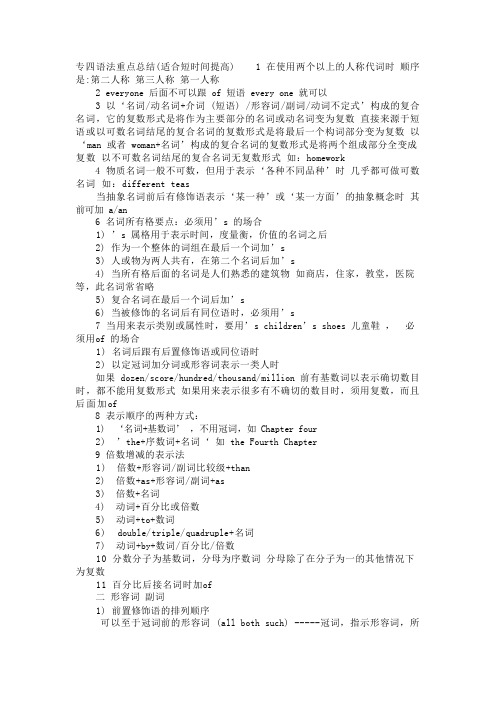
专四语法重点总结(适合短时间提高) 1 在使用两个以上的人称代词时顺序是:第二人称第三人称第一人称2 everyone 后面不可以跟 of 短语 every one 就可以3 以‘名词/动名词+介词 (短语) /形容词/副词/动词不定式’构成的复合名词,它的复数形式是将作为主要部分的名词或动名词变为复数直接来源于短语或以可数名词结尾的复合名词的复数形式是将最后一个构词部分变为复数以‘man 或者 woman+名词’构成的复合名词的复数形式是将两个组成部分全变成复数以不可数名词结尾的复合名词无复数形式如:homework4 物质名词一般不可数,但用于表示‘各种不同品种’时几乎都可做可数名词如:different teas当抽象名词前后有修饰语表示‘某一种’或‘某一方面’的抽象概念时其前可加 a/an6 名词所有格要点:必须用’s 的场合1) ’s 属格用于表示时间,度量衡,价值的名词之后2) 作为一个整体的词组在最后一个词加’s3) 人或物为两人共有,在第二个名词后加’s4) 当所有格后面的名词是人们熟悉的建筑物如商店,住家,教堂,医院等,此名词常省略5) 复合名词在最后一个词后加’s6) 当被修饰的名词后有同位语时,必须用’s7 当用来表示类别或属性时,要用’s children’s shoes 儿童鞋,必须用of 的场合1) 名词后跟有后置修饰语或同位语时2) 以定冠词加分词或形容词表示一类人时如果 dozen/score/hundred/thousand/million 前有基数词以表示确切数目时,都不能用复数形式如果用来表示很多有不确切的数目时,须用复数,而且后面加of8 表示顺序的两种方式:1) ‘名词+基数词’ ,不用冠词,如 Chapter four2) ’the+序数词+名词‘ 如 the Fourth Chapter9 倍数增减的表示法1) 倍数+形容词/副词比较级+than2) 倍数+as+形容词/副词+as3) 倍数+名词4) 动词+百分比或倍数5) 动词+to+数词6) double/triple/quadruple+名词7) 动词+by+数词/百分比/倍数10 分数分子为基数词,分母为序数词分母除了在分子为一的其他情况下为复数11 百分比后接名词时加of二形容词副词1) 前置修饰语的排列顺序可以至于冠词前的形容词 (all both such) -----冠词,指示形容词,所有格形容词,不定形容词 (a an the this your his any some)-----------基数词 ( one ) 序数词 (first)------------ 表示性质,状态,质量的形容词(good useful)--------------表示大小,长短,形状的形容词------------- ---表示年龄,新旧,温度的形容词------------表示颜色的形容词---------- -----------表示国籍,产地,区域的形容词-----------表示材料,用做形容词的名词----------动名词,分词2) 后置修饰语由前缀 a-构成的形容词3) 形容词修饰由 some-,any-,every-,no-,-body,-one,-thing 等组成的复合不定代词时,必须后置4) enough 作形容词修饰名词时既可放前又可放后,但当它作副词修饰形容词或副词时,必须后置5) 有些形容词本身就有‘比....年长’ ,‘比.......... 优等的意思这些形容词后面用介词 to 而不用 than6) much too 作为副词短语修饰形容词或副词,不修饰名词7) more 不能用来修饰比较级8) 与名词连用的 more of a .../as much of a.../more of a....意为更像....9) as much of a...意为称得上,less of a 意为算不上10) none other than(不是别人,正是) =no other than11) any/sone/every 与 other 连用时,其后若用可数名词,一般为单数三情态动词1) can 用于否定句 cannot(help)but 表示不能不,只能 (but 后跟不带 to 的动词不定式)2) must 表示禁止,一定不要时的否定式为mustn’t 当它表示有把握的推断时意为一定准是时它的否定形式为 can’t3) need doing=need to be done 这个句型表示被动意味4) need not have done sth 表示本来没有必要做某事 (经常考)四虚拟语气从句主句1) 与过去事实相反 had+过去分词 should (第一人称) would(其它人称) +have+过去分词与现在事实相反一般过去式 (动词be用 were)would/should/could/might+动词原型与将来事实相反过去式或 should/were+动原would/should/could/might+动词原型2) It is (high/about/the)time.........谓语动词用过去式指现在或将来的情况表示早该做某事而现在已经有点晚了3) It is the first(second/third)time 后的 that 从句中,谓语动词要用完成体来表示一种经验4) as if/though 的虚拟要点1) 对当时事实的假设,从句谓语用过去式,be 动词一律用were2) 对过去事实的假设,从句谓语用过去完成式3) 对未来事实的假设,从句谓语用would+动词原型。
英语专业四级语法专题讲解
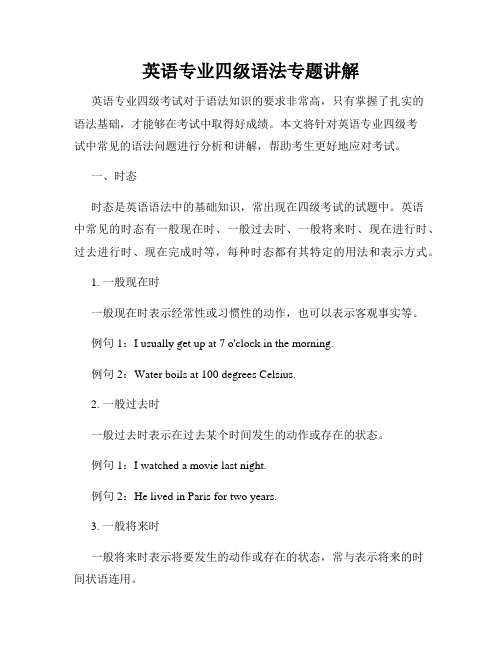
英语专业四级语法专题讲解英语专业四级考试对于语法知识的要求非常高,只有掌握了扎实的语法基础,才能够在考试中取得好成绩。
本文将针对英语专业四级考试中常见的语法问题进行分析和讲解,帮助考生更好地应对考试。
一、时态时态是英语语法中的基础知识,常出现在四级考试的试题中。
英语中常见的时态有一般现在时、一般过去时、一般将来时、现在进行时、过去进行时、现在完成时等,每种时态都有其特定的用法和表示方式。
1. 一般现在时一般现在时表示经常性或习惯性的动作,也可以表示客观事实等。
例句1:I usually get up at 7 o'clock in the morning.例句2:Water boils at 100 degrees Celsius.2. 一般过去时一般过去时表示在过去某个时间发生的动作或存在的状态。
例句1:I watched a movie last night.例句2:He lived in Paris for two years.3. 一般将来时一般将来时表示将要发生的动作或存在的状态,常与表示将来的时间状语连用。
例句1:I will visit my grandparents next weekend.例句2:She is going to travel around the world after graduation.4. 现在进行时现在进行时表示现在正在进行的动作。
例句1:They are studying in the library now.例句2:I am reading a book at the moment.5. 过去进行时过去进行时表示过去某个时间正在进行的动作。
例句1:She was cooking dinner when I arrived home.例句2:I saw him while he was walking in the park.6. 现在完成时现在完成时表示过去发生的动作对现在造成的影响或结果。
英语专业四级语法

英语专业四级语法
英语专业四级语法
1、主谓一致。
这类考题灵活性大,需要根据实际情况判断谓语动词的单复数形式。
一部分具有生命意义的集合名词做主语时谓语动词多采用复数形式,如
peoplepoultrymilitia等;用and连接的成分
表单一概念时谓语动词用单数:就近原则:主语中
含有某些连词(如aswellasbesidesin
additionto等)时,谓语动词的数同第一个主语保持一致。
2、倒装结构。
表示强调或突出,分为全部倒装和部分倒装。
那些否定词(组)、介词短语能引起倒装句。
部分倒装和全部倒装有和区别,as在倒装结构中的用法及意义等等,都是考生应当重视的地方。
3、非谓语动词。
这是词汇与结构考试中语法部分的重中之重,解题时可以从三个方面入手:
根据非谓语动词同其所修饰的名词或逻辑主语的一致关系,确定使用主动语态或被动语态,然后考虑采用现在分词、现在分词被动式或过去分词。
英语专业四级语法汇总

语法回顾篇专四语法考点虚拟语气、情态动词、非谓语动词、复合句、倒装、小语法(省略,时态,反义疑问句,代词,强调句,主谓一致,冠词,形容词及副词)、as 的特殊用法。
专四英语语法考点串讲之一虚拟语气一般说来,有下列几种考点需要考生注意(十考点及两备考点)考点1. 与现在事实相反从句谓语动词用did(be用were),主句谓语动词would(should,could,might)+do;考点2. 与过去事实相反从句谓语动词用had done,主句谓语动词用would(should,could,might)+ have done;例如:43.I _________the party much more if there hadn‟t been quite such a crowd of people there.A. would enjoyB. will have enjoyedC. would have enjoyedD. will be enjoying49.All of us would have enjoyed the party much more if there _________ quite such a crowd of people there.A. weren‟tB. hasn‟t beenC. hadn‟t beenD. wouldn‟t考点3.与将来事实相反,从句谓语动词用:did(should+do或were + to do),主句谓语动词用:would(should,could,might)+do。
例如:43. If your car ___ any attention during the first 12 months, take it to an authorized dealer.(08年)• A. shall need C. would need• B. should need D. will need考点4. 时态的交叉现象,也就是主句与从句的动作发生在不同的时间段例如:If you had gone to see the doctor,you would be all right now.你要是早去看病,你现在就没事了。
专四语法重点总结

专四语法重点总结一、代词、名词、数次1. 在使用两个以上的人称代词时顺序是:第二人称第三人称第一人称2. everyone后面不可以跟of短语every one 就可以3. 以‘名词/动名词+介词(短语)/形容词/副词/动词不定式’构成的复合名词,它的复数形式是将作为主要部分的名词或动名词变为复数直接来源于短语或以可数名词结尾的复合名词的复数形式是将最后一个构词部分变为复数以‘man 或者woman+名词’构成的复合名词的复数形式是将两个组成部分全变成复数以不可数名词结尾的复合名词无复数形式如:homework4. 物质名词一般不可数,但用于表示‘各种不同品种’时几乎都可做可数名词如:different teas5. 当抽象名词前后有修饰语表示‘某一种’或‘某一方面’的抽象概念时其前可加a/an6. 名词所有格要点:必须用’s的场合1 )’s属格用于表示时间,度量衡,价值的名词之后2 ) 作为一个整体的词组在最后一个词加’s3) 人或物为两人共有,在第二个名词后加’s4 )当所有格后面的名词是人们熟悉的建筑物如商店,住家,教堂,医院等,此名词常省略5) 复合名词在最后一个词后加’s6) 当被修饰的名词后有同位语时,必须用’s7) 当用来表示类别或属性时,要用’s children’s shoes 儿童鞋必须用of的场合1) 名词后跟有后置修饰语或同位语时2) 以定冠词加分词或形容词表示一类人时7. 如果dozen/score/hundred/thousand/million前有基数词以表示确切数目时,都不能用复数形式如果用来表示很多有不确切的数目时,须用复数,而且后面加of8.表示顺序的两种方式:1)‘名词+基数词’,不用冠词,如Chapter four2) ’the+序数词+名词‘如the Fourth Chapter9. 倍数增减的表示法1) 倍数+形容词/副词比较级+than2) 倍数+as+形容词/副词+as3) 倍数+名词4) 动词+百分比或倍数5) 动词+to+数词6) double/triple/quadruple+名词7) 动词+by+数词/百分比/倍数10. 分数分子为基数词,分母为序数词分母除了在分子为一的其他情况下为复数11. 百分比后接名词时加of二、形容词、副词1 前置修饰语的排列顺序可以置于冠词前的形容词(all both such) -----冠词,指示形容词,所有格形容词,不定形容词(a an the this your his any some)-----------基数词(one ) 序数词(first)------------ 表示性质,状态,质量的形容词(good useful)--------------表示大小,长短,形状的形容词----------------表示年龄,新旧,温度的形容词------------表示颜色的形容词---------------------表示国籍,产地,区域的形容词-----------表示材料,用做形容词的名词----------动名词,分词2.后置修饰语由前缀a-构成的形容词3.形容词修饰由some-,any-,every-,no-,-body,-one,-thing等组成的复合不定代词时,必须后置4.enough作形容词修饰名词时既可放前又可放后,但当它作副词修饰形容词或副词时,必须后置5.有些形容词本身就有‘比……年长’,‘比……优等的意思这些形容词后面用介词to 而不用than6.much too 作为副词短语修饰形容词或副词,不修饰名词7.more 不能用来修饰比较级8.与名词连用的more of a .. ./ as much of a... / more of a.... 意为更像……9.as much of a……意为称得上,less of a 意为算不上10.none other than(不是别人,正是)=no other than11.any/sone/every与other连用时,其后若用可数名词,一般为单数三、情态动词、虚拟语气1.can 用于否定句cannot(help)but表示不能不,只能(but后跟不带to的动词不定式)2.must 表示禁止,一定不要时的否定式为mustn’t 当它表示有把握的推断时意为一定准是时它的否定形式为can’t3.need doing=need to be done 这个句型表示被动意味4.need not have done sth 表示本来没有必要做某事(经常考)虚拟语气1.It is (high/about/the)time... 谓语动词用过去式指现在或将来的情况表示早该做某事而现在已经有点晚了2.It is the first(second/third)time后的that从句中,谓语动词要用完成体来表示一种经验3.as if/though 的虚拟要点1) 对当时事实的假设,从句谓语用过去式,be动词一律用were2)对过去事实的假设,从句谓语用过去完成式3)对未来事实的假设,从句谓语用would+动词原型五、比较级比较等级的含义:英语中形容词与副词有三个比较等级,即原级,比较级和最高级。
- 1、下载文档前请自行甄别文档内容的完整性,平台不提供额外的编辑、内容补充、找答案等附加服务。
- 2、"仅部分预览"的文档,不可在线预览部分如存在完整性等问题,可反馈申请退款(可完整预览的文档不适用该条件!)。
- 3、如文档侵犯您的权益,请联系客服反馈,我们会尽快为您处理(人工客服工作时间:9:00-18:30)。
英语专业四级语法汇总语法回顾篇:专四语法考点虚拟语气、情态动词、非谓语动词、复合句、倒装、小语法(省略,时态,反义疑问句,代词,强调句,主谓一致,冠词,形容词及副词)、as 的特殊用法。
专四英语语法考点串讲之一虚拟语气一般说来,有下列几种考点需要考生注意(十考点及两备考点)考点1. 与现在事实相反从句谓语动词用did (be用were),主句谓语动词would (should, could, might)+do;考点2. 与过去事实相反从句谓语动词用had done,主句谓语动词用would(should, could, might)+ have done;例如:43. I _________the party much more if there hadn’t been quite such a crowd of people there.A. would enjoyB. will have enjoyedC. would have enjoyedD. will be enjoyingKEY: C49. All of us would have enjoyed the party much more if there _________ quite sucha crowd of people there.A. weren’tB. hasn’t beenC. hadn’t beenD. wouldn’t KEY: C考点3.与将来事实相反,从句谓语动词用:did (should + do或were + to do),主句谓语动词用:would (should, could, might)+do。
例如:43. If your car ___ any attention during the first 12 months, take it to an authorized dealer. (08年)• A. shall need B. should need C. would need D. will need KEY: B考点4. 时态的交叉现象,也就是主句与从句的动作发生在不同的时间段例如:If you had gone to see the doctor,you would be all right now.你要是早去看病,你现在就没事了。
考点5. 虚拟条件句if可以省略,但从句的语序要用到装,即将were, had或should移至主语的前面形成倒装,但否定词not不前移。
例如:65.___, he would not have recovered so quickly.(05年)• A. Hadn't he been taken good care of• B. Had he not been taken good care of• C. Had not he been taken good care of• D. Had he been not taken good care of•KEY: B考点6. insist(一个坚持);order, command(两道命令);suggest, advise, propose (三条建议);ask, require, request, demand (四点要求)及相应的名词的从句,谓语要使用:(should)+动词原形或动词原形例如:58. It was recommended that passengers ___ smoke during the flight. (04年)• A. not B. need not C. could not D. would notKEY: A考点7. It is +advisable, essential, important, imperative, incredible等等相关的从句,谓语要使用:(should)+动词原形或动词原形例如:46. It is imperative that students ____ their term papers on time.(04年)• A. hand in B. would hand in• C. have to hand in D. handed in•KEY: A考点8. it is high(about) time that的结构中,从句使用一般过去式例如:54 It’s high time we __ cutting down the rainforests.(06年)A stoppedB had to stopC shall stopD stopKEY: A考点9. much as尽管,虽然,引导让步状语从句,从句中用would have done表示假设,可以使说话人的语气变得十分委婉,真诚。
例如:52. Much as ____, I couldn’t lend him the money because I simply didn’t havethat much spare cash.(99年)A. I would have liked toB. I would like to haveC. I should have to likeD.I should have liked toKEY: A考点10. if only表示要是…就好了相当于wish, as if/as though 的用法。
与现在事实相反:动词过去式与过去事实相反: had + done与将来事实相反:could/would + do例如:52. If only I __play the guitar as well as you! (06 年)A wouldB couldC shouldD might KEY: B备考1. would rather或would sooner后跟宾语从句,从句中使用一般过去式或过去完成式分别表示对现在或过去的虚拟,表示“宁愿某人作某事”例如:The manager would rather his daughter ____ in the same office now.A. had not workedB. not to workC. does not workD. did not workKEY: D备考2.用于lest, for fear that(唯恐,以防)引导的状语从句。
在lest, for fear that 等引导的状语从句中,通常用"(should +)原形动词"这一虚拟语气形式例如:The mad man was put in the soft-padded cell lest he ________ himself.A. injureB. had injuredC. injuredD. would injureKEY: A专四语法考点串讲之二情态动词考试中,情态动词部分重点测试以下内容:(1)情态动词+行为动词完成式(2)某些情态动词的特殊用法1. must have v-edmust have v-ed 表示推测过去某事“一定”发生了。
其否定形式为:can’t / couldn’t have v-ed, 表示过去不可能发生某事。
例如:Since the ditch is full of water, it must have rained last night.2. could have v-ed 表示推测过去某动作“很可能”发生了3. may / might have v-ed 表示推测过去某事“也许”发生了.may 比might 表示的可能性在说话人看来稍大些。
4.ought to / should have v-ed 和ought not to / shouldn’t have v-ed用于对已发生的情况表示“责备”、“不满”,分别表示“本应该…”和“本不应该…”表示应完成而未完成的动作用于完成时中的否定句,表示不应完成但已做的动作5.needn’t have v-ed 表示过去做了某事,但没有做的必要,意为“本没必要…”。
例如:You needn’t have waken me up; I don’t have to go to work today.注意:did not need to do 动作并没发生例:I didn’t need to get up early, so I didn’t get up until 9 a.m.*特殊用法(1) can’t表示“不可能”,may not 表示“不可以”,mustn’t(must not) 表示“不许可,禁止”,needn't (need not) 表示“不必”,dare not +动词原形表示“不敢”(2) must表推测的否定现在式用can’t ,过去式用couldn’t(3) May I / we …?这一类疑问句的肯定回答为Yes, please.或Certainly;否定回答为Please don’t.或No, you mustn’t. 例如:“May we leave now?” “No, you mustn’t. You haven’t finished your home work yet.”(4) need I / we …?这一类疑问句的肯定回答为Yes, we must; 否定回答为needn’t(5)在回答must引起的问题时,如果是否定的答复,不能用mustn’t,而要用needn’t或don’t have to(6)May/might as well may……but….(表转折)(7) I wish to go home with you, may I?(8) Do help yourself to have fruit, won’t you/ will you? (表示一种委婉的请求)*情态动词短语的使用would like to do…would rather do…would rather + 从句would prefer to do...had better do...*情态动词: will(愿意), shall(将), must(必须), can, may, would, should(应该), might, could, ought to, used to(过去常常), need(需要), dare(竟敢),have to(不得不)*dare, need 也可作一般(行为)动词*情态动词一般用法的否定:mustn’t 不准, 禁止,不要can’t(couldn’t) 不会;不能;may (might) not 不可以;needn’t 没必要( = don’t have to )used not/usedn’t to或didn’t use to… 过去不…dare not 不敢*情态动词推测用法Must 一定,肯定can’t (couldn’t) 不可能Can/ could 可能Can’t (couldn’t) 不可能may/ might “可能,也许” May (might) not 也许不,可能不*推断用法should/ought to“按理应当,应该是;shouldn’t 不应该( = ought not to )*情态动词+have +done结构表示对过去动作的推测1.must have done:对过去的肯定推测,译作“一定做了…”,只能用于肯定句中。
